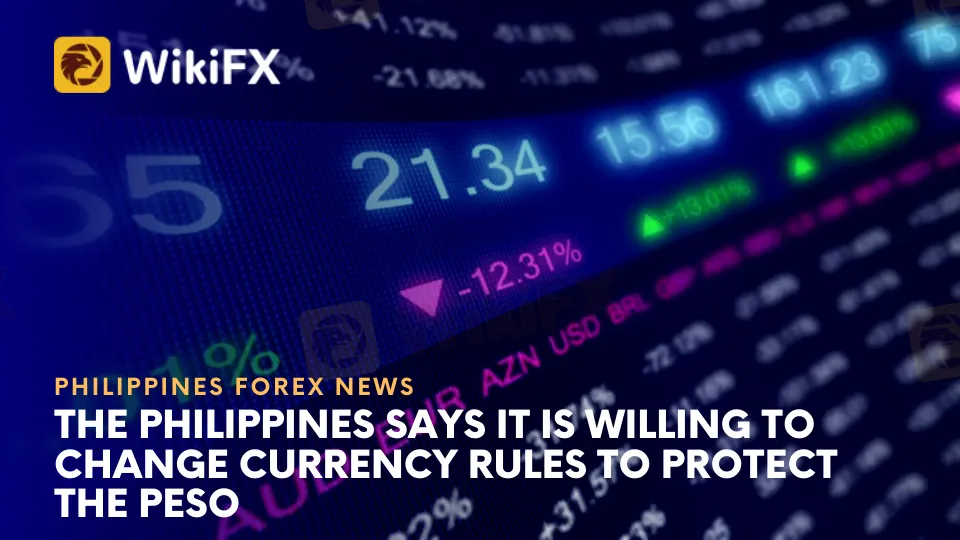简体中文
繁體中文
English
Pусский
日本語
ภาษาไทย
Tiếng Việt
Bahasa Indonesia
Español
हिन्दी
Filippiiniläinen
Français
Deutsch
Português
Türkçe
한국어
العربية
The Philippines Says It Is Willing To Change Currency Rules To Protect The Peso
Abstract:The Philippine central bank said it may tweak foreign-exchange policy to assist reduce speculation, emphasizing its preparedness to react to inflationary dangers despite the peso's recent gains.

The Philippine central bank said it may tweak foreign-exchange policy to assist reduce speculation, emphasizing its preparedness to react to inflationary dangers despite the peso's recent gains.
Dollar purchases thought to be “speculative,” or those without underlying client transactions, have surged and are putting pressure on the peso, according to the Bangko Sentral ng Pilipinas in an email on Friday. It replied to inquiries submitted on October 17, when the peso hit a new low of 59 pesos to the dollar.
The BSP said, “As an inflation-targeting central bank, the BSP will continue to react to currency rate fluctuations to the extent that they influence or constitute a danger to the inflation forecast.”
The BSP said that policies such as foreign-exchange position limitations and risk weights for non-deliverable futures are in place to prevent risk-taking behavior. These “may be changed countercyclically to avoid financial imbalances.”
Currently, a bank's consolidated net open foreign currency position cannot exceed 25% of its qualifying capital or $150 million, whichever is less.
The Philippine peso, Southeast Asia's poorest performer this year, climbed 0.2% versus the dollar at 2:30 p.m. local time to 57.27 after the BSP's previously announced 75-basis-point key rate rise on Thursday. This quarter, the currency recovered more than 2%, reversing the year's losses.
The BSP also said that it employs moral suasion to reduce speculation and lately “encouraged banks to cooperate” to assist maintain the currency market “orderly.”
Stay tuned for more Forex news.
Download the WikiFX App from the App Store or Google Play Store to stay updated on the latest news.

Disclaimer:
The views in this article only represent the author's personal views, and do not constitute investment advice on this platform. This platform does not guarantee the accuracy, completeness and timeliness of the information in the article, and will not be liable for any loss caused by the use of or reliance on the information in the article.
Read more

Justice Served: Illegal Investment Scheme Ends in RM28 Million Repayment
The Kuala Lumpur High Court has ruled that a Singaporean businessman, Chan Cheh Shin, must return RM28 million to 122 Malaysian investors after the court determined that his investment operations were conducted illegally.

Tokyo Police Arrest 4 for Unregistered FX Trading Scheme
Four men in Tokyo were arrested for running an unregistered FX trading operation, collecting over ¥1.6 billion from 1,500 investors.

Doo Group Expands Its Operations with CySEC License
Doo Financial, part of Doo Group, receives a CySEC license, allowing FX/CFD services in Europe. This strengthens its global presence and regulatory standards.

Exness: Revolutionizing Trading with Cutting-Edge Platforms
Exness offers traders seamless experiences with its Exness Terminal and Exness Trade app, providing flexibility, advanced tools, and low-cost trading.
WikiFX Broker
Latest News
BSP Shuts Down Uno Forex Over Serious AML Violations
ACY Securities Expands Global Footprint with South Africa Acquisition
Rupee gains against Euro
Tokyo Police Arrest 4 for Unregistered FX Trading Scheme
Axi Bids AUD 52M to Acquire Low-Cost Broker SelfWealth, Outbidding Competitor Bell Financial
Crypto Influencer's Body Found Months After Kidnapping
US Regulators Tighten Oversight on Bank Anti-Money Laundering Efforts
Doo Group Expands Its Operations with CySEC License
RM900,000 Scammed: The Hidden Dangers of Online Investment Schemes
5 Advantages of Choosing a Regulated Broker
Currency Calculator


